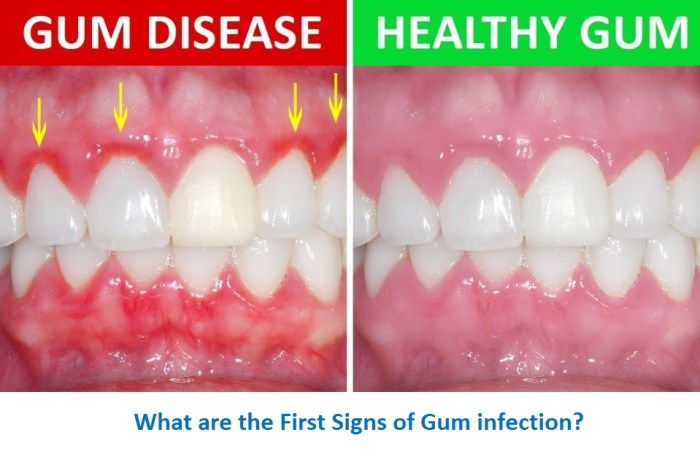
How to cure gum disease without a dentist – When it comes to gum disease, who needs a dentist, right? We’ve got your back with a treasure trove of natural remedies and home care secrets that will make your gums sing with joy. Get ready to ditch the dental blues and embrace a healthy smile, all without breaking the bank or facing the dreaded dentist’s chair.
Natural Remedies for Gum Disease
Gum disease is a common problem that can lead to serious health issues if left untreated. While there are many conventional treatments for gum disease, there are also a number of natural remedies that can be effective in preventing and treating the condition.
Some of the most common natural remedies for gum disease include:
Salt Water Rinses
Salt water rinses are a simple and effective way to reduce inflammation and kill bacteria in the mouth. To make a salt water rinse, dissolve 1/2 teaspoon of salt in 8 ounces of warm water. Rinse your mouth with the solution for 30 seconds, then spit it out.
Repeat several times a day.
If you’re looking for a natural way to cure gum disease without a dentist, there are a few things you can do. How to cure gum disease without a dentist is a great resource that can help you get started.
There are a number of different ways to cure gum disease without a dentist, so you’re sure to find one that works for you.
Tea Tree Oil
Tea tree oil is a natural antiseptic and antibacterial agent that can be effective in treating gum disease. To use tea tree oil, add a few drops to a glass of water and rinse your mouth for 30 seconds. Repeat several times a day.
Gum disease can be a serious issue, but it doesn’t have to be a pain to cure. If you’re looking for a way to get rid of gum disease without a dentist, there are a few things you can do.
You can try using a natural mouthwash, like one made with tea tree oil or baking soda. You can also try brushing your teeth with a toothpaste that contains fluoride. And if you’re really struggling, you can always try how to cure gum disease without a dentist .
Clove Oil
Clove oil is a natural pain reliever and antibacterial agent that can be effective in treating gum disease. To use clove oil, apply a few drops to a cotton ball and place it on the affected area. Leave it in place for 10-15 minutes, then rinse your mouth with warm water.
Home Care Practices for Gum Health

Maintaining optimal gum health is crucial for overall oral hygiene and well-being. Incorporating proper home care practices, such as effective brushing and flossing techniques, can significantly prevent and reduce the risk of gum disease. Here’s a comprehensive guide to help you establish a healthy home care routine for your gums.
Brushing Techniques
- Choose a soft-bristled toothbrush:Soft bristles are gentle on the gums and effectively remove plaque without causing irritation or damage.
- Use a pea-sized amount of fluoride toothpaste:Fluoride strengthens tooth enamel and helps prevent cavities.
- Brush for at least two minutes, twice a day:Dedicate sufficient time to brushing, ensuring you cover all surfaces of your teeth and along the gum line.
- Use a gentle circular motion:Avoid harsh scrubbing, as this can damage the gums and tooth enamel. Instead, use gentle circular motions to effectively remove plaque and bacteria.
- Brush the outer, inner, and chewing surfaces of your teeth:Thoroughly clean all surfaces of your teeth to prevent plaque buildup and gum inflammation.
Flossing Techniques
Flossing is essential for removing plaque and food particles from between your teeth, where your toothbrush can’t reach.
- Use unwaxed floss:Unwaxed floss is easier to maneuver between teeth and effectively removes plaque.
- Wrap about 18 inches of floss around your middle fingers:Leave enough floss to comfortably reach all areas of your mouth.
- Gently slide the floss between your teeth:Avoid snapping or forcing the floss, as this can damage your gums.
- Curve the floss around the base of each tooth:This ensures you’re cleaning both the tooth surface and the gum line.
- Move the floss up and down several times:Use gentle back-and-forth motions to remove plaque and food particles.
Toothbrush and Toothpaste Selection
Choosing the right toothbrush and toothpaste can enhance your home care routine.
- Toothbrush:Opt for a soft-bristled toothbrush with a small head that can easily reach all areas of your mouth.
- Toothpaste:Choose a toothpaste that contains fluoride and is designed for gum health. Look for ingredients like triclosan or cetylpyridinium chloride, which have antibacterial properties.
Lifestyle Modifications for Gum Health: How To Cure Gum Disease Without A Dentist

Maintaining good gum health requires not only proper oral hygiene but also adopting a healthy lifestyle. Certain habits, such as smoking, excessive alcohol consumption, and poor nutrition, can significantly contribute to the development and progression of gum disease. Understanding the impact of these factors and making necessary lifestyle modifications is crucial for preserving gum health.
Gum disease is a common problem that can lead to serious health issues if left untreated. The good news is that there are a number of things you can do to cure gum disease without a dentist, including brushing your teeth twice a day , flossing regularly, and using an antiseptic mouthwash.
If you’re experiencing any of the symptoms of gum disease, such as bleeding gums, swelling, or pain, it’s important to see a dentist as soon as possible.
Smoking is one of the most significant risk factors for gum disease. The chemicals present in cigarettes damage the gum tissue, making it more susceptible to infection. Quitting smoking is essential for improving gum health and overall well-being.
Alcohol Consumption
Excessive alcohol consumption can also negatively affect gum health. Alcohol can dehydrate the body, reducing saliva production. Saliva plays a vital role in maintaining a healthy oral environment by neutralizing acids, washing away food particles, and inhibiting bacterial growth. When saliva production is reduced, the risk of gum disease increases.
Nutrition
A healthy diet is essential for overall health, including gum health. A diet rich in fruits, vegetables, and whole grains provides the necessary vitamins, minerals, and antioxidants that support healthy gums. Vitamin C, in particular, is crucial for collagen production, which is essential for maintaining strong and healthy gum tissue.
DIY Remedies for Gum Pain and Inflammation

If you’re experiencing gum pain and inflammation, don’t worry; there are several effective home remedies you can try to alleviate your discomfort. These remedies are easy to make and use and can provide quick relief from gum pain and inflammation.
Natural Mouthwashes
Natural mouthwashes can help reduce inflammation and kill bacteria in the mouth. Here are a few recipes you can try:
- Saltwater Rinse:Mix 1/2 teaspoon of salt in 8 ounces of warm water. Swish the solution around your mouth for 30 seconds, then spit it out.
- Tea Tree Oil Mouthwash:Add 2-3 drops of tea tree oil to 8 ounces of warm water. Swish the solution around your mouth for 30 seconds, then spit it out. Do not swallow tea tree oil, as it can be toxic if ingested.
- Hydrogen Peroxide Mouthwash:Mix 1/2 cup of 3% hydrogen peroxide with 1/2 cup of water. Swish the solution around your mouth for 30 seconds, then spit it out. Do not swallow hydrogen peroxide, as it can cause stomach upset.
Pain-Relieving Gels, How to cure gum disease without a dentist
Pain-relieving gels can be applied directly to the gums to numb the pain. Here are a few recipes you can try:
- Aloe Vera Gel:Apply pure aloe vera gel directly to the gums. Aloe vera has anti-inflammatory and pain-relieving properties.
- Clove Oil Gel:Mix 2-3 drops of clove oil with 1 teaspoon of coconut oil. Apply the gel directly to the gums. Clove oil has antibacterial and pain-relieving properties.
Precautions
While these remedies can be effective in alleviating gum pain and inflammation, it’s important to use them with caution. Some remedies may not be suitable for everyone, and some may interact with medications you’re taking. If you’re pregnant, breastfeeding, or have any underlying health conditions, talk to your doctor before using any of these remedies.
It’s also important to note that these remedies are not a substitute for professional dental care. If you’re experiencing gum pain and inflammation, see your dentist as soon as possible to rule out any underlying dental problems.
When to Seek Professional Help
It’s crucial to seek professional dental care if you experience persistent or severe gum disease symptoms. Early diagnosis and treatment can prevent complications and preserve your oral health.
Signs and Symptoms
* Persistent bad breath or a bad taste in your mouth
- Red, swollen, or bleeding gums
- Gums that are receding or pulling away from your teeth
- Loose or shifting teeth
- Pain or discomfort while chewing or brushing
- Sensitivity to hot or cold foods and drinks
- Pus between your teeth and gums
Importance of Regular Checkups and Cleanings
Regular dental checkups and cleanings are essential for maintaining good gum health. During these appointments, your dentist will:* Examine your gums for signs of disease
- Remove plaque and tartar buildup
- Educate you on proper oral hygiene techniques
Finding a Qualified Dentist
When choosing a dentist for gum disease treatment, consider their:* Experience and expertise in gum disease treatment
There are many ways to cure gum disease without a dentist. One way is to use a mouthwash that contains chlorhexidine. Another way is to use a toothpaste that contains fluoride. You can also try using a water flosser to remove plaque and bacteria from your teeth and gums.
If you have severe gum disease, you may need to see a dentist for treatment. However, if you catch it early, you can often cure gum disease without a dentist. For more information on how to cure gum disease without a dentist , visit our website.
- Credentials and certifications
- Patient reviews and testimonials
- Office location and availability
It’s recommended to schedule an initial consultation to discuss your concerns and treatment options.
Final Conclusion

So, there you have it, folks! Whether you’re a gum disease newbie or a seasoned pro, these natural remedies and home care tips will help you keep your gums happy and healthy. Remember, prevention is key, so brush, floss, and rinse like a boss.
And if things get a little out of hand, don’t hesitate to seek professional help. Your gums will thank you for it!
Essential Questionnaire
Can I really cure gum disease without a dentist?
While natural remedies and home care can help manage gum disease, it’s important to consult a dentist for proper diagnosis and treatment. They have the expertise and tools to address underlying causes and prevent further damage.
How often should I rinse with salt water?
Rinsing with warm salt water twice a day is generally recommended. It helps reduce inflammation and kill bacteria.
Is flossing really that important?
Absolutely! Flossing removes plaque and bacteria from between teeth, where your toothbrush can’t reach. It’s crucial for preventing gum disease and cavities.





